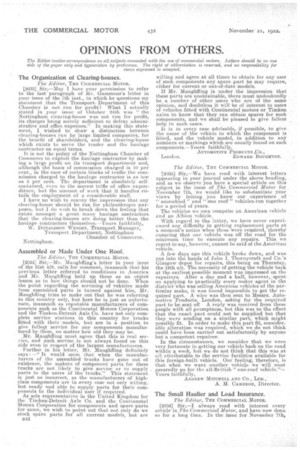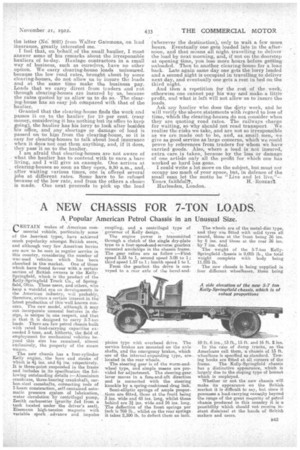OPINIONS FROM OTHERS.
Page 26

Page 27

If you've noticed an error in this article please click here to report it so we can fix it.
The Editor invites corre.spondence on all subjects connected with the use of COM raercial motors. Letters should be on one side of the paper only and typewritten by preference, The right of abbreviation is reserved, and no responsibility for views expressed is accepted.
The Organization of Clearing-houses.
The Editor, THE COMMERCIAL Moro&
DOW Sir,—May I have your permission to refer to the last paragraph of Mr. Gammons's letter in your issue of the 7th inst., in which he questions my statement that the TransportDepartment of this Chamber is not run for profit? What I actually stated in your issue of October 24th was the Nottingham clearing-house was not run for profit, its charges being merely sufficient to defray administrative and office.expenses." In making this statement, I wished to draw a distinction between clearing-houses run by large limited companies, for the benefit of shareholders, and the elearing-beuse which exists to serve the trader and the haulage contractor on equal terms.
Ibis not the policy of the Nottingham Chamber of Commerce to .exploit the haulage contractor by making a large profit on its transport department and, although the basis of commission charged is 10 per cent., in the case of certain blocks of traffic the commission charged to the haulage contractor is as low as 5 per cent. The department is absolutely selfcontained, even to the merest. trifle of office. expenditure, but the amount of work that it handles entails the employment of a considerable staff.
I have no wish to convey the impression that ally clearing-house should be run for philanthropic purposes, but I do wish to break down the feeling that exists amongst a great many haulage contractors that the clearinghouses are doing better than the haulage contractors themselves.—Yours faithfully, W. DONALDSON WRIGHT, Transport Manager, Transport Department., Nottingham Chamber of Commerce. Nottingham. •
Assembled or Made Under One Roof.
The Editor, THE COMMERCIAL MOTOR.
[2034] Maughfling's letter in your issue of the 31st ult. calls for comment, inasmuch that his previous letter referred to conditions in America and Mr. Maughfling held up these as an object lesson as to how things should not be done. When the point regarding the servicing of vehicles made from. assembled parts is turned against him, Mr. Maughfling tries to make out that he was referring to this country only, but here he is just as unfortunate, inasmuch as reputable manufacturers of components such as the Continental -Motors Corporation and the Timken-Detroit Axle Co. have not only complete service• stations in this country for trucks fitted with their models, but are in a position to give fullesit service for any components manufactured by them, no.matter how old they may be. " Mr. Maughfling must agree that this is real service, and such _service is not always found on this side e.Ven in respect of the largest manufacturers.
Further in his letter, 'Mr. Maughfling definitely says :—" It would see.m that when the manufacturers of the assembled trucks have gone out of existence, the makers of component pa•rts for these trucks are not likely to .give service or to supply parts to the niers of the trucks." This statement is just as incorrect, as the manufacturers of highclass components are in-every ease not only willing, but ready and able to supply parts for their components to the individual user if required.
As sole representative in the United Kingdom for the Timken-Detroit Axle Co. and the Continental Motors Corporation for components and spare parts for same, we wish to point out that not only do we stock spare parts for all current models, but are
1342 willing and agree at all times to obtain for any user of such components any spare part he may require, either for current or out-of-date models.
If Mr. Maughfling is under the impression that these parts are unobtainable, there must undoubtedly be a number of other users who are of the some opinion, and doubtless it will be of interest to users of vehicles fitted with Continental motors or Timken axles to know that they can obtain spares for such components, and we shall be pleased to give fullest help in such eases.
It is in every case advisable, if possible, to give the name of the vehicle to which the component is fitted, and. the vehicle model, in addition to any numbers or markings which are usually found on such components.—Yours faithfully, AT.TTOMOTIVE PRODUCTS Co., London. EDWARD BOUGHTON.
. The Editor, THE COMMERCIAL MOTOR.
[20351 ISir,—We have react with interest letters appearing in your journal under the above heading, and as we observe you have a special article on this subject in the issue of The Commercial Motor for November 7th, we would like to substantiate your views by letting you know our experience of " assembled " and " one roof " vehicles,run together for a period of years.
The vehicles we own comprise an American vehicle and an Albion vehicle,
With regard to the latter, we have never experienced any difficulty in getting replacement parts at a moment's notice when these were rewired, thereby ensuring that our vehicle was off the road for the minicouna time to execute any repairs. This we regret to say, however, cannot be said of the American vehicle.
A few days ago this vehicle broke down, and was put into the hands of John I. Thornyeraft and Co.'s Cdasg-ow depot for repairs, this being on Thursday, the 19th ult. The necessity of getting the vehicle back at the earliest possible moment was impressed on the repairers. After a day and a ha]f, however, spent on applying to practically every motor agent in the district who was selling American vehicles of the particular make, it was found impossible to get the required part. A wire was then sent to Messrs. Automotive Products, London, asking for the required part to be sent off A rep/y was received from these ...people with all promptness, but this was to the effect that the exact part could not be supplied but that they were sending on a similar part, which might possibly Et. In order to make this part fit, considerable alteration was required, which we do not think
• could have been carried out satisfactorily by anyone but a competent repairer.
In the circumstances., we consider that we were very fortunate in getting our vehicle back on the road. within a week, but we do not think that this was at all attributable to the service faeilities available for this foreign-built vehicle. Our feeling, 'therefore, is that when we want :another vehicle we will most assuredly go fOr the all-liritish " one-roof vehicle."— Yours faithfully,
ANDREW MITCHELL AND CO., LTD., A. M. CAMERON, Director.
The Small Haulier and Load Insurance.
The Editor, THE COMMERCIAL MOTOR.
[2036] Sir,—I always read with interest every article in The Commercial Motor, and have now done so for a long time. In the issue for November 7111,
the letter (N6. 2027) from Walter Gammons, on lead insurance, greatly interested me.
I feel that, on behalf, of the small haulier, I must answer some of his remarks about the irresponsible hauliers of to-day. Haulage contractors in a, email way of business, such as ourselves, have no other option. We carry clearing-house loads uninsured. because the law road rates, brought about by some clearing-houses, do not allow us to insure the loads and at the same time make the businees pay. Loads that we carry 'direct from traders kind not through clearing-houses are insured by us, because the rates quoted by us allow us to do so.The clearing-house has an easy job compared with that of the haulier.
Granted that the clearing-house finds the work and passes it on to the haulier for 10per cent. (easy money, considering it has nothing but its office to keep going), the haulier has his lorry to look after besides his office, and any shortage or damage of load is passed on -to him from the clearing-house, So it is easy for clearing-houses to talk about load insurance when it does hOt cost them anything, and, if it does, they pass-it on to the haulier.
I am afraid that clearing-houses are not aware of what the haulier has to contend with to earn a bare living, and I will give an example. Onearrives at clearing-houses so soon as they open, 9.20 a.m., and, after waiting various times, one is offered several jobs at different rates. Sonic have to . be refused because of the low rate, and from the others a choice is made. -One next proceeds to pick up the load (wherever the destination), only to wait a few more hours. Eventually one gets loaded late in the afternoon, and that means all night travelling to deliver the load by next morning, and, if not on the doorstep at opening time, you lose more hours before getting unloaded. Then to another clearing-house for a load back. Late again same day one gets the lorry loaded and a second night is occupied in travelling to deliver next day, and eventually one gets a rest in bed on the third night.
And then a repetition for the rest of the week, otherwise one cannot pay his way and makea little profit, and what is left will not allow us to insure tho loads.
Ask any haulier who does the dirty work, and he will verify the above statements with regard to loss of time, which the clearing-houses do not consider when they are quoting road rates. The railways charge for waiting, so why should not road transport We realize the-risks we take, and are not so irresponsible as we are made out to be, and, as. small men, we give as good service as large concerns, which we could prove by referenees from traders for whom we hal/6 carried goods. Also where a load is not insured, extra care is taken, 'because by the loss or damage of one article only all the profit -for which one has worked so hard has gone. I could write a lot more on the subject, but must notoccupy too much of your space, but, in defence of the small riktth let the motto be "Live and let live.."-
Yours faithfullYr, H. ROBERA. Harlesden, London.






























